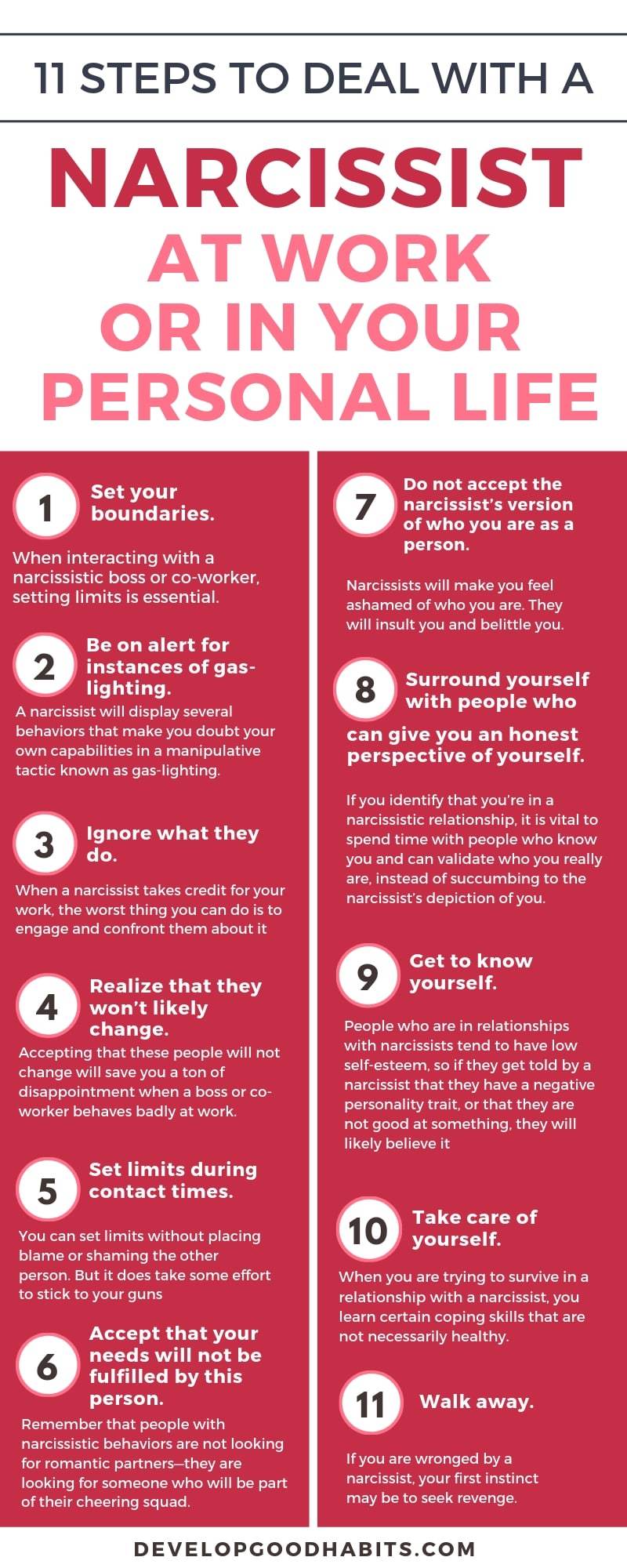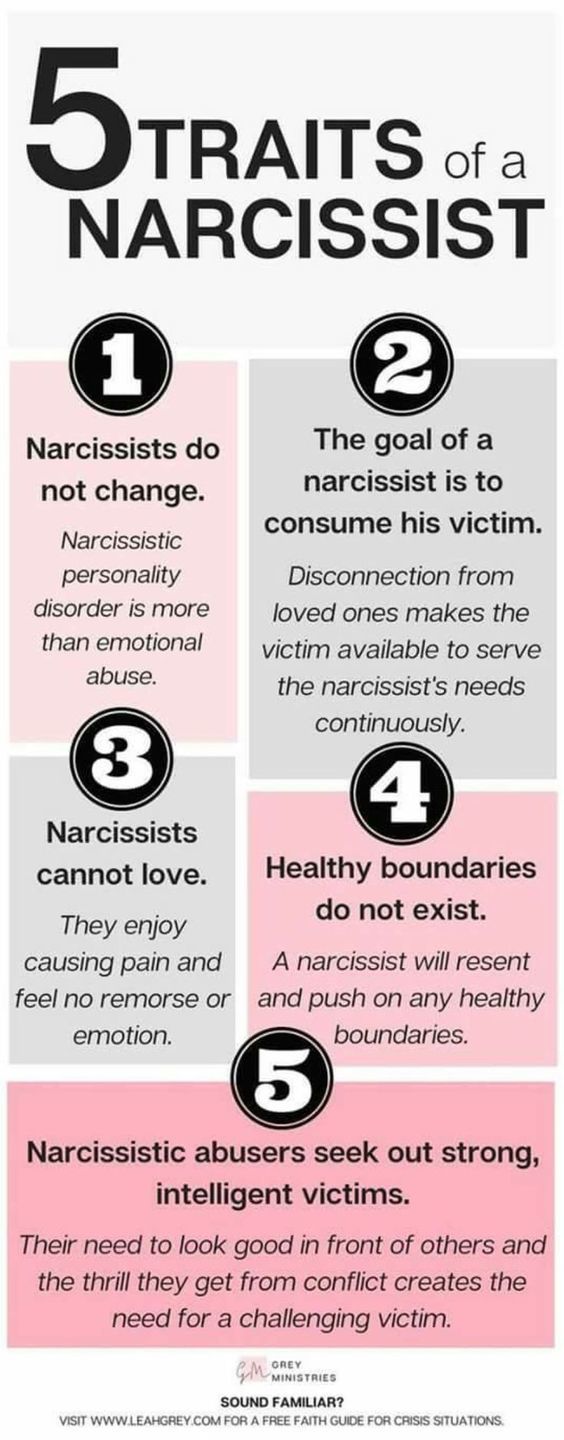Do you know a narcissist? Are you frustrated by a person in your life who demands attention all the time?
Or someone who seems insensitive to other people’s feelings?
Is there a member of your family who constantly puts other people down, including you?
Or do you have that friend who, no matter what the topic of conversation is, steers the focus towards themselves?
If any of these questions sound familiar, then you might have a narcissist in your life.
Just like other people with toxic personalities, narcissists can have a negative impact on your sense of well-being.
It can be draining to interact with them. They forcibly control other people and have unrealistic expectations. Any topic of conversation will revolve around them, a sign of the aptly called term conversational narcissism.
It does not matter that you’re grieving, in pain, or have problems—they have a way of steering the conversation so that they will be the center of attention.
If you’re in a relationship with a narcissist, you run the risk of losing your sense of self through the insults, put-downs, and lies that a narcissistic person is capable of using to gain the control that they desire.
However, narcissists don’t walk around with a warning label attached to them, and they usually have a talent for charming people at first in order to reel them in.
It is often too late for people to realize that someone close to them—whether a co-worker, boss, husband, sister-in-law, wife, or parent—has narcissistic traits.
Some relationship experts say that the best way to deal with a narcissistic relationship is to walk away. If you find that you aren’t able to do so, this article will show you some other strategies that you can use to deal with a narcissist effectively, whether in the workplace or in your personal life.
First, let’s quickly discuss the personality profile of a narcissist.
6 Defining Characteristics of a Narcissist
Regardless of their role in your life, a narcissist can be identified by the following telltale traits.
1. Needing constant admiration.
Narcissists need attention and praise like others need food. They need their egos to be fed at all times. To support this need, they surround themselves with people who can quench their hunger for admiration.
They will collect a following of people who constantly remind them of how good they are and place them on a pedestal. They have an exaggerated sense of their own achievements or talents, and they expect other people to see them as being superior, even if they don't have a demonstrated record in a particular area.
Narcissists expect other people to worship them just as they worship themselves. To get this admiration, a narcissist may make sure to always have the nicest clothes or newest smartphone, or they may use more covert methods to gain admiration, just by sweet-talking people.
They also belittle their rivals and understate the successes of others because they can't stand to be upstaged. No matter what anyone else achieves, a narcissist thinks they can do better.
2. Accusing you.
Narcissists are likely to accuse you of the very things that they are doing wrong. They project their weaknesses onto others because they refuse to take responsibility for them. Narcissists strongly dislike their own vulnerabilities and feelings of unworthiness.
Narcissists are incapable of accepting the fact that they are “wrong” and “imperfect” at any time and fail to see that being wrong sometimes is part of the normal human experience.
When you confront a narcissist about a possible mistake they are making, you are showing them their imperfections, which sends them on an automatic mission to project those wrongdoings onto you.
By doing this, they are punishing you for challenging them, and they are making you the person who is in the wrong. A narcissist can use a number of methods to project their mistakes onto others, including lying, exaggerating, distorting, or falsely quoting a third party.
But the truth is, the narcissist is speaking into a mirror. The narcissist’s accusations toward you and the things that you are “doing” are identical to what the narcissist feels about himself.
3. Demeaning, demanding, and bullying.
When a narcissist feels that somebody has a skill or ability that they lack, they often put that person down.
They can be patronizing of the other person by bullying or threatening them when they refuse to acknowledge their “greatness,” or simply outshine.
Narcissists will use gossip or confidential discussions and try to appear to be concerned about someone else's well-being, and then blatantly belittle, lie, or otherwise harm their reputation.
Narcissists degrade others and tear them down. They use tactics such as sarcasm, constant criticism, name-calling, blaming, gaslighting, and humiliation to weaken other people and diminish their sense of self-confidence and self-worth. This enables the narcissist to feel powerful and in control of others' lives.
The narcissist picks up on other people's vulnerabilities, fears, and values to get what they want. They gain other people's trust before using fear tactics to harm them. They are not above using threats or other toxic methods to make people be submissive to them in some way.
4. Blaming others.
When narcissists make mistakes, they do not take the blame or admit it. Instead, they point their finger towards someone else. This is similar to when they accuse you of something that they did themselves.
Narcissists prefer to externalize blame because they never want to fault themselves—doing so would lead to a sense of emotional pain that would be too hard to handle. Their unconscious minds can even build defenses to protect their fragile egos.
The defenses of denial and projection make every mistake someone else’s fault. Blaming other people keeps narcissists from feeling anxious or hating themselves.
Narcissists have to look better than they know they actually are, which means they have to do “impression management” to keep up their perceived appeal to others. They may use blame to try to justify their attacks on other people, but in the end, they have no empathy or shame about what they do.
If you've ever felt like you're stuck in a rut, constantly hitting roadblocks on your path to success, this video is an absolute must-watch:
5. Taking criticisms personally.
Narcissists are hypersensitive to criticism, taking it as a personal affront to their greatness. They don't understand if someone sees them as being anything less than perfect, so if they hear someone questioning their perfection, they are quick to get defensive, and often use it as an opportunity to attack.
Further, they love playing the victim by trying to get undeserving pity. Any criticism that could make them look bad will be quickly denied and responded to with harsh insults.
While they certainly don’t come across this way, narcissists have very fragile egos, so when their sense of self is disturbed, they are quick to react.
Narcissists take things personally because they don't recognize that different people can have different opinions. It takes a while for anyone to be able to separate their own experience from someone else's, and this distinction can easily become lost for someone like a narcissist who lives with a vulnerable state of mind.
6. Exploiting others.
For narcissists, other people’s emotions don’t count or matter. This lack of empathy makes it easy for them to take advantage of others’ kindness just to get what they want, without having any concern for their potential impact on anyone else.
They will also try to claim recognition for other people's hard work without hesitation, so they can get recognized and rewarded.
Narcissists are exploitative in personal and professional relationships, yet they are constantly paranoid that they will be betrayed by other people. They take more than they deserve, without remorse, and don't feel like they need to justify themselves because they believe they are special, and therefore rules should not apply to them.
Also, they have no conscience about double standards due to their sense of self-entitlement.
This video describes other traits that narcissistic people possess. The video uses Elizabeth Holmes (of the ill-famed Theranos) as the prime example of a narcissist.
How to Deal With a Narcissist at Work
As mentioned above, narcissists can have a negative impact on your life. Here are some tips that you can use when dealing with a narcissist at your workplace.
1. Set your boundaries.
When interacting with a narcissistic boss or co-worker, setting limits is essential. Narcissists don't possess healthy boundaries, and they don't like it when other people tell them what they can and cannot do.
Learn to say “no” when you feel that a narcissist is intruding on your time or space. To set a fast boundary, instead of arguing with a narcissist at work, you can simply say that you disagree with what’s being said, and end the conversation.
Map out an exit plan ahead of time and know when it is time to draw the line.
Remember, you don't need to justify or explain your reason for leaving the conversation or situation. Enforce the boundaries that you set without giving into their personal needs.
Setting your boundaries will be a continuous task as your interactions with this person progress. Keep this in mind so you will be prepared to adjust your expectations.
2. Be on alert for instances of gaslighting.
A narcissist will display several behaviors that make you doubt your own capabilities in a manipulative tactic known as gaslighting.
Some of these behaviors may include questioning your memory regarding a particular incident, changing the subject of a crucial conversation, claiming your concerns are “trivial,” or completely denying their narcissistic behavior. You have to trust your own reality in order to avoid being a victim of gaslighting.
If you suspect that you are in a situation involving gaslighting, try doing some periodic mental checks to overturn the diminishing reality that you're experiencing.
Think about times where you have felt negative emotions at work, and document who was involved in the interaction and what the subject was. Do this reflection for a while, and you might end up seeing a pattern that illuminates the source of the problem.
3. Ignore what they do.
When a narcissist takes credit for your work, the worst thing you can do is to engage and confront them about it. This only sets the stage for the narcissist to play victim, and you end up being the bad guy in the workplace.
A narcissistic co-worker will always be focused on getting ahead, showing off their ingrained superiority over other people, and rejecting any evidence that they aren't perfect. However, if they are overstepping onto your turf to the point that they are diminishing your chances of getting ahead at work, you can't simply ignore that.
At the same time, you can't take the normal course of action of approaching the co-worker and telling them that their actions are unacceptable. Instead, make sure you are recording all of your work when you are working with this person so you can have documentation of your original ideas. Save all of your relevant emails and take notes during meetings.
4. Realize that they won’t likely change.
Accepting that these people will not change will save you a ton of disappointment when a boss or co-worker behaves badly at work. It can be a factor in helping you decide whether to stay in a toxic work environment or look for a more uplifting workplace.
Once you realize that you cannot change this person, you have to decide if you can change your attitude about them, or if you have the ability to ignore or avoid them.
It is virtually impossible to change a narcissistic coworker. Instead, you have to change how you think of them and adjust your expectations accordingly. You will be more equipped to put their words and actions into context when you can detach yourself from the expectation that they will display logical behavior.
Here’s an infographic about the traits of a narcissistic person. Use it as a quick reference for the signs to look out for.
How to Deal With a Narcissist in Your Personal Life
Here are some tips on how to deal with a narcissist who is in your personal life—whether as a sibling, a parent, a spouse, or a romantic partner.
5. Set limits during contact times.
If you only see this family member during gatherings, set limits on their behavior when you’re with them. One way to do this is through a “connection contract.” Doing this involves telling the other person what behaviors will be the signal for you to stay away from them. Hopefully, they will get it.
You can set limits without placing blame or shaming the other person. But it does take some effort to stick to your guns. You will want to communicate your limits clearly and directly. In the end, you will be empowered and feel better about your ability to cope with the narcissist in your life.
6. Accept that your needs will not be fulfilled by this person.
Remember that people with narcissistic behaviors are not looking for romantic partners—they are looking for someone who will be part of their cheering squad.
The relationships that narcissists are in are not two-way streets—they function to benefit only the narcissist. They will never consider your needs or seek out ways to make you happy or make your life easier in some way.
In fact, when you continuously accommodate their extreme selfishness, you’re only confirming to them that your needs don’t matter as much as theirs do. Alter your expectations so that you are never looking to this person to make you happy or be an emotional support system.
7. Do not accept the narcissist’s version of who you are as a person.
Narcissists will make you feel ashamed of who you are. They will insult you and belittle you. They will not hesitate to exaggerate the truth in an attempt to destroy your image or to point out your shortcomings in front of other people.
Refuse to cave in. Be confident in your reality and firm in your beliefs regarding your talents and abilities. A narcissist won’t take the time to truly get to know you, your values, your talents, or your goals.
This means that they will never know the true version of who you are as a person. This negativity from a narcissist is undeserved and unfounded. In order to not accept their opinion about you…
8. Surround yourself with people who can give you an honest perspective of yourself.
If you identify that you’re in a narcissistic relationship, it is vital to spend time with people who know you and can validate who you really are, instead of succumbing to the narcissist’s depiction of you.
Just hearing positive things about you from people who take the time to get to know you will increase your confidence in your ability to stand up for yourself. This will also remind you that, if and when you leave the relationship, you will have friends and family who will be there to support and love you.
9. Get to know yourself.
People who are in relationships with narcissists tend to have low self-esteem, so if they get told by a narcissist that they have a negative personality trait, or that they are not good at something, they will likely believe it.
However, if you take the time to really get to know yourself, you will be able to be confident in the fact that what a narcissist is telling you about yourself is wrong.
It is easier to fend off the toxic influence of a narcissistic partner if you have a strong sense of self. A healthy dose of self-love can help you find the happiness you need so you can withstand the onslaught of criticism from anyone, especially a narcissist.
Doing this will allow you to take anything the narcissist says with a grain of salt and be able to walk away from interactions with them without getting your feelings hurt or second-guessing yourself.
If you want to learn more about yourself, check out our article on toxic personality tests.

10. Take care of yourself.
When you are trying to survive in a relationship with a narcissist, you learn certain coping skills that are not necessarily healthy. You develop them to protect yourself from the emotional strain that the narcissist puts on your life, but these coping skills often have downfalls.
For example, you may learn to act catatonic to protect yourself from feeling pain, but doing so will often prevent you from feeling positive emotions, as well such as joy and self-empathy.
Alternatively, you may learn to suppress your outward emotions to prevent further attacks from the narcissist, but this can also decrease your ability to have feelings about other people’s emotions.
To avoid being drained by a narcissist, constantly practice self-care. It restores your energy and helps you feel more grounded. When you practice self-care, your fuse becomes longer, your mood improves, and you will laugh more easily.
11. Walk away.
If you are wronged by a narcissist, your first instinct may be to seek revenge. However, trying to get revenge simply gives a narcissist more energy to keep fighting.
The more you try to get back at a narcissist, the more power you're offering them and the more aggression you will bring out. As we have mentioned several times, you will have very little luck if you try to teach a narcissist a lesson.
There will be instances when the best solution is to walk away from the relationship with a narcissist and stop expecting anything from them. Do so in the most careful way.
Disengage with them in order to start to see who they really are, rather than the person you imagine they can be.
You need not fear to be alone. This may be the best way to regain your happiness and health. Remember, the only person who can make you happy is you. Happiness is a personal decision that you must make.
The video below gives insight into how a narcissistic mind works, describes what type of people usually end up having relationships with narcissistic individuals, and offers tips on how to safely walk away from a relationship with a narcissist.
Final Thoughts on How to Deal With a Narcissist
Having a narcissist in your life is undoubtedly a challenging experience. They usually take advantage of your kindness and generosity. They can drain your energy. Sometimes, when things go on for too long, you lose your sense of self.
Hopefully, the 11 tips provided above on how to deal with a narcissist can help protect you from being taken advantage of by someone with this personality disorder.
You need to be mindful and observant of your daily interactions with a person in your life who is identified as being a narcissist. You can love them, but remember that you cannot change them. It is up to them to make that decision.
Focus instead on knowing yourself better and giving yourself more love. Positive affirmations can keep negative thinking at bay, and this post provides you with over a thousand examples of affirmations to lift you up.
And if you're looking for more resources on how to deal with a narcissist, be sure to check out these blog posts:
- How to Leave a Narcissist: 13 Steps to End This Relationship
- 4 Ways to Deal with Conversational Narcissism
- 11 Strategies for Tactfully Leaving a Toxic Work Environment



